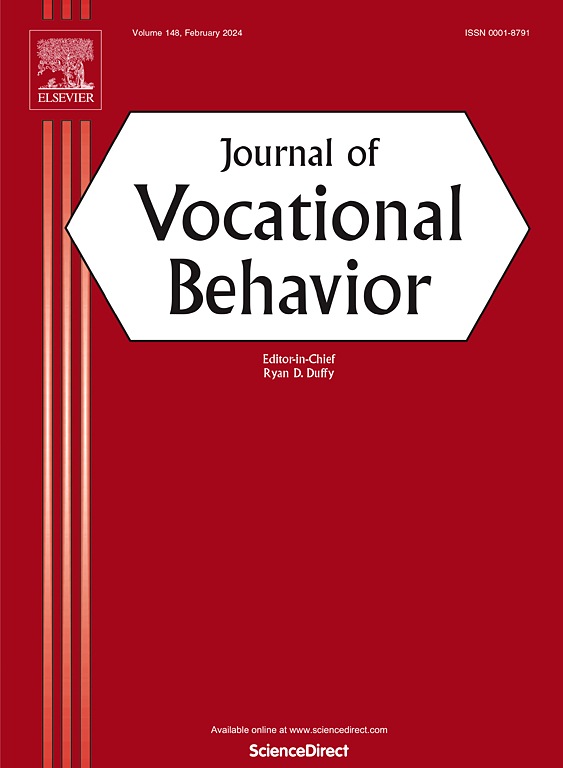动员社会资本与事业成功:一个检索、推荐和强化模型
IF 5.2
1区 心理学
Q1 PSYCHOLOGY, APPLIED
引用次数: 0
摘要
社会资本被广泛用于解释员工的客观和主观职业成功。然而,拥有社会资本是一回事,能够使用它是另一回事。在开创性的社会资源理论中,社会动员过程被理论化为将社会资本转化为有价值的工作或职业成果的关键中介过程(Lin, 1999,2001)。尽管它很重要,但社会资本动员受到了有限的学术关注,这可能是由于将其作为实时事件或个人行为在延长的职业轨迹中进行测量的实证挑战。我们创新地绕过了这个长期存在的方法论挑战,专注于已经在某个时间点动员起来的社会资本。我们认为,社会资本是不时被动员起来的,并积累成储存在个人社会网络中的可动员社会资本。通过定性研究,我们归纳出了在检索、推荐和强化(3Rs)网络中调动社会资本的三种形式,分别捕获了职业相关信息的检索、社会联系带来的机会和社会联系带来的生产力溢出。在随后的定量研究中,我们在一家小型高科技创业公司采用全网络方法对这3r进行了操作,发现检索和强化与两个职业成功结果(即薪酬和职业满意度)呈正相关,而转介与主管评价的晋升率呈正相关。本文章由计算机程序翻译,如有差异,请以英文原文为准。
Mobilized social capital and career success: A model of retrieval, referral, and reinforcement
Social capital has been widely used to explain employees' objective and subjective career success. However, having social capital is one thing, and being able to use it is another thing. In the seminal social resources theory, the social mobilization process is theorized as a key intermediary process to transform social capital into valued job or career outcomes (Lin, 1999, 2001). Despite its importance, social capital mobilization has received limited scholarly attention, possibly due to the empirical challenges of measuring it as real-time events or individual behaviors over an extended career trajectory. We innovatively bypass this long-standing methodological challenge by focusing on the social capital that has already been mobilized at some point in time. We argue that social capital is mobilized from time to time and accumulates into mobilized social capital stored within an individual's social network. Through a qualitative study, we inductively identified three forms of mobilized social capital in the networks of retrieval, referral, and reinforcement (3Rs), which respectively capture the retrieval of career-related information, opportunities arising from social connections, and productivity spillover from social contacts. In a subsequent quantitative study, we employed a whole-network approach in a small high-tech start-up to operationalize these 3Rs and found that retrieval and reinforcement were positively associated with two career success outcomes (i.e., salary and career satisfaction), while referral was positively associated with supervisor-rated promotability.
求助全文
通过发布文献求助,成功后即可免费获取论文全文。
去求助
来源期刊

Journal of Vocational Behavior
PSYCHOLOGY, APPLIED-
CiteScore
13.10
自引率
5.40%
发文量
85
期刊介绍:
The Journal of Vocational Behavior publishes original empirical and theoretical articles offering unique insights into the realms of career choice, career development, and work adjustment across the lifespan. These contributions are not only valuable for academic exploration but also find applications in counseling and career development programs across diverse sectors such as colleges, universities, business, industry, government, and the military.
The primary focus of the journal centers on individual decision-making regarding work and careers, prioritizing investigations into personal career choices rather than organizational or employer-level variables. Example topics encompass a broad range, from initial career choices (e.g., choice of major, initial work or organization selection, organizational attraction) to the development of a career, work transitions, work-family management, and attitudes within the workplace (such as work commitment, multiple role management, and turnover).
 求助内容:
求助内容: 应助结果提醒方式:
应助结果提醒方式:


